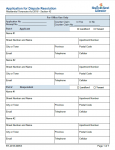When disagreements arise between a landlord and tenant an Application for Dispute Resolution can be filed with Service NL to bring the matter to a hearing in front of an adjudicator. The adjudicator will decide on the matter after taking all the facts and evidence into consideration.
It is important to read over the instructions carefully when completing the application form. Inaccurate information on the form could lead to delays hearing your case.
There are several different reasons why a landlord or tenant may want to file an application with Service NL, and the applicant is required to indicate the reason on the application form.
Below we will go over the different reasons why someone may want to file an application.
Types of Applications
Validity of Notice of Termination
A landlord or tenant would file this type of application to have Service NL make a decision on whether a termination notice is valid or not.
Refund of Security Deposit
A tenant would file this type of application when seeking a refund of the security deposit or a remaining balance of the security deposit.
Refund of Rent
A tenant would file this type of application to ask for a partial refund of the rent paid to the landlord. Typically, these types of applications would be made in cases where the rental unit was left in disrepair by the landlord, even after they were notified of issues requiring repair or maintenance. This type of application can also be filed in cases where there was a loss of a privilege or service that was previously included in the rent and the amount of rent wasn’t reduced accordingly, such as the loss of a parking spot.
Compensation for Inconvenience
A tenant would file this type of application when they are seeking compensation for items payable for inconvenience. An example of this could be if the tenant is locked out of the rental premises by the landlord and has to pay money for accommodation elsewhere. In most cases actual receipts are required at the hearing.
Repairs/Rent to be Paid in Trust
A tenant would file this type of application when they require repairs to the rental unit. The tenant must be able to show that a notice has been given to the landlord (proof of service required) and a reasonable amount of time has been given to the landlord to repair or correct a situation. Rent must be paid up-to-date. The tenant may request that rent be reduced or paid in trust to Service NL until such time as the repairs are completed.
Return of Possessions
A landlord or tenant would file this type of application for the return of personal property taken by the other party. In cases where the property cannot be returned Service NL can award compensation to the owner of the property that was taken.
Vacant Possession of Property
A landlord would file this type of application when they are requesting possession of their property (rental unit, apartment) based upon a notice of termination. A landlord should have a copy of the notice of termination with him when filing this type of application as this notice must be attached to the application.
Payment of Rent
A landlord would file this type of application when it is believed the tenant owes money for rent. The landlord must provide a breakdown of the rent periods claimed and a breakdown of the rent owing. The landlord is required to provide their complete rental records at the hearing.
Compensation for Damages
A landlord would file this type of application when they believe the tenant is responsible for damages to the rental property. A breakdown of the damages and amount for each item is required.
A tenant would file this type of application when they believe the landlord is responsible for damages to their personal property. A breakdown of the damages and amount of each item is required.
It is very important to ensure the information provided as part of the claim is clear so that the other party can tell what they are being charged with damaging and the cost of materials and labour to repair the damages. Actual receipts and/or estimates are required at the hearing. Rental premises condition reports, photographs, videos, witnesses, etc. may be used as evidence at the hearing. The age of the damaged items (flooring, painting, etc.) may be considered as awards are generally based on depreciation of items.
Payment of Utilities
A tenant would file this type of application when it is believed that utility charges were paid which may have been the responsibility of the landlord.
A landlord would file this type of application when it is believed the tenant did not pay utility charges for which they were responsible for paying to the landlord.
Payment of Late Fees
A landlord would file this type of application if they were seeking late fees in addition to any money that the tenant owes for rent.
Application of Security Deposit to Payment Owed
The landlord would file this type of application if seeking permission to apply the security deposit toward any amount awarded.
Mediation Service
As part of the dispute resolution process Service NL offers a free mediation service prior to a hearing. Mediation offers the landlord and tenant the chance to come to an agreement with the help of a mediator, without bringing the issue to a hearing. If an agreement is reached in mediation it is final and binding on the landlord and the tenant.
Cancelling or Rescheduling a Hearing
If you need to cancel or reschedule a hearing for any reason you should contact Service NL as soon as possible. In some cases, it may not be possible to reschedule a hearing, so contacting Service NL as soon as possible will improve the likelihood that your request will be granted.
Notice of Hearing
Once an application has been filed and a hearing date has been scheduled you will be provided with a copy of the completed application form, with the hearing information included, a copy of which must be served on each respondent. You must provide a copy of this notice to the other parties at least 10 days before the hearing date.
Notice can be served by:
- Giving it personally to the other party;
- Sending it to the other party by prepaid registered mail or prepaid express post at an address provided by the other party;
- Sending it electronically where
- It is provided in the same or substantially the same form as the written notice or document,
- The other party has provided an electronic address for receipt of documents, and
- It is sent to that electronic address; or
- Sending it to the other party by courier service at an address provided by the other party.
Where the landlord is a company, a notice may be served by giving it personally to a director, manager or other officer of that company or by leaving it at, or sending it to, the registered office of that company by registered mail, courier, or electronically.
If a notice or document is sent by registered mail or express post, it shall be considered to have been served on the fifth day after mailing, and the service may be proved by providing evidence that the notice or document was prepaid and properly addressed and sent.
If a notice or document is sent electronically, it shall be considered to have been served on the day it is sent, if the document is sent by 4 p.m., or the next day that is not a weekend or holiday, if the document is sent after 4 p.m.
If the respondent does not attend the hearing or contact Service NL, the applicant will be asked to prove that the respondent was properly served the application not less than 10 clear days before the hearing date. Proof of service may include an affidavit by the person who delivered the notice and/or the delivery confirmation from the post office. These 10 days do not include the day of service or day of the hearing.
If for some reason you are not able to serve the notice as required (i.e. you do not have a valid mailing address for the respondent) you must contact Service NL as soon as possible. You may be able to reschedule the hearing for a later date to allow more time for the notice to be served.
If you have made reasonable efforts to serve a notice on someone and haven’t been able to properly serve them, you can apply to the Director of Residential Tenancies at Service NL for permission to use some other method to serve your documents. For your application to be successful you will need to show that the method being proposed for serving your notice is likely to reach the intended recipient and that you have a history of communicating with the other person that way.
Counterclaims
A respondent who believes that he or she has a claim against the applicant may make a counterclaim. A counterclaim follows all the same rules and procedures as a regular claim, as explained above. If both parties were given proper notice prior to the hearing both the original claim and the counterclaim will be heard at the same hearing. In cases where one party has not given proper notice of the hearing to the other, the hearing may be rescheduled for a later date unless both parties agree to hear both applications at the original hearing. In some cases, a claim and a counterclaim can be split and heard separately if deemed appropriate by the adjudicator.
Application Fees
Application for refund of the security deposit or to keep the security deposit – Free
All other applications – $20




